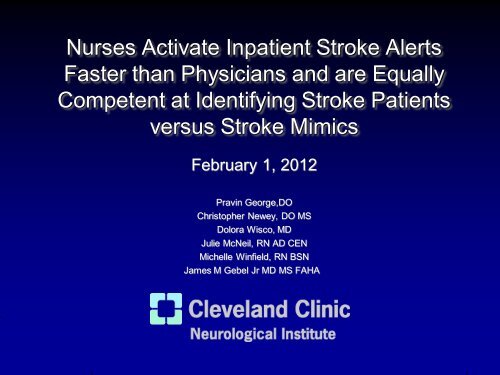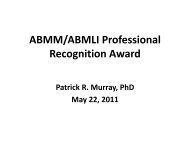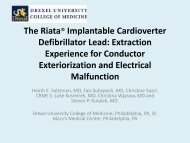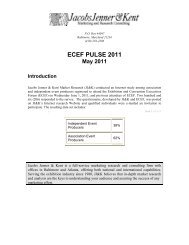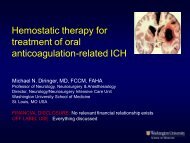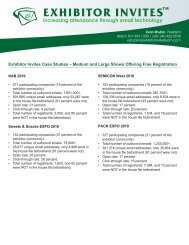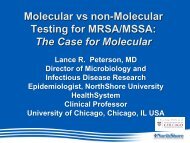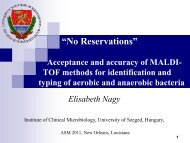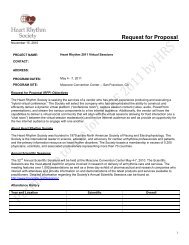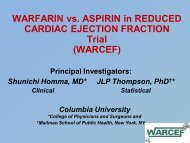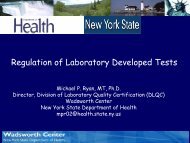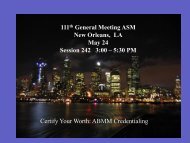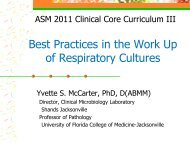Nurses Activate Inpatient Stroke Alerts Faster than Physicians and ...
Nurses Activate Inpatient Stroke Alerts Faster than Physicians and ...
Nurses Activate Inpatient Stroke Alerts Faster than Physicians and ...
You also want an ePaper? Increase the reach of your titles
YUMPU automatically turns print PDFs into web optimized ePapers that Google loves.
<strong>Nurses</strong> <strong>Activate</strong> <strong>Inpatient</strong> <strong>Stroke</strong> <strong>Alerts</strong><br />
<strong>Faster</strong> <strong>than</strong> <strong>Physicians</strong> <strong>and</strong> are Equally<br />
Competent at Identifying <strong>Stroke</strong> Patients<br />
versus <strong>Stroke</strong> Mimics<br />
February 1, 2012<br />
Pravin George,DO<br />
Christopher Newey, DO MS<br />
Dolora Wisco, MD<br />
Julie McNeil, RN AD CEN<br />
Michelle Winfield, RN BSN<br />
James M Gebel Jr MD MS FAHA
Introduction<br />
• The in hospital stroke team “stroke alert”<br />
is activated by <strong>Physicians</strong> or <strong>Nurses</strong><br />
when acute stroke is suspected<br />
• In-patient strokes represent an excellent<br />
treatment opportunity<br />
• Over-Triaging of stroke alerts can<br />
overwhelm acute stroke team resources
Introduction<br />
• Our stroke nurse, coordinator <strong>and</strong><br />
physicians collaborated to design <strong>and</strong><br />
implement an educational initiative<br />
• Focus was to improve quality <strong>and</strong><br />
timeliness of acute stroke identification<br />
<strong>and</strong> stroke alert activation in high risk<br />
units<br />
- Focus was on non-neurological floor <strong>and</strong><br />
ICU nurses
• Reached out to:<br />
Introduction<br />
• Non-Neurological Floor Nurse Managers<br />
• Medical Emergency Team Managers<br />
• Non-Neurological Floor Nurse Educators<br />
• Nursing ACLS Instructors<br />
• Focused stroke education on<br />
• Patient’s Assessment relating to acute strokes<br />
• Importance of the “Last Known Well” time<br />
• “Time-to-treatment” considerations<br />
• Encouraged <strong>and</strong> empowered nursing to activate stroke alerts<br />
immediately<br />
• Acknowledged nursing on an individual basis
Hypothesis<br />
• Educated non-neurological nurses<br />
activating the stroke alert system will<br />
identify as great a proportion of acute<br />
strokes (as opposed to stroke mimics) as<br />
physicians in the same units<br />
• Educated non-neurological nurses will<br />
activate the stroke alert system as fast as<br />
physicians in the same units
Methods<br />
• Retrospectively analyzed prospectively<br />
collected consecutive inpatient stroke alert<br />
calls for a 1 year period<br />
- Neurological floors were excluded<br />
• Person activating the stroke alert was<br />
identified via the EMR review<br />
• Final diagnosis of stroke vs. non-stroke or<br />
“stroke mimic” designated by final<br />
discharge diagnosis
• Statistics:<br />
Methods<br />
- proportion of patients with true stroke vs.<br />
mimic was compared via Chi-Square<br />
analysis<br />
- Time from symptoms to stroke alert<br />
activation compared with Wilcoxon Rank<br />
Sum test<br />
- Stratified by Physician vs. Nurse
Results (Accuracy of Dx)<br />
• <strong>Nurses</strong> activated 59/93 (63%) of stroke<br />
alert calls<br />
• <strong>Physicians</strong> activated 34/93 (37%) of the<br />
stroke alert calls<br />
• 59% (37/59) of the nursing activated stroke<br />
alert call patients had final dx of stroke as<br />
compared to 63% (20/34) of physician<br />
activated calls [p=.71]
Results<br />
• 60% (56/93) of the stroke alert calls came<br />
from the Cardiology <strong>and</strong> Cardiothoracic<br />
Surgery units<br />
• Accuracy of stroke diagnosis of nurse<br />
activated calls from the cardiology/CTS<br />
units was 67% as compared to 53% for<br />
other non-neurological units [p=.323]
Results (Time to activation)<br />
• <strong>Nurses</strong> activated stroke alert calls a<br />
median of 2 hours [25th, 75th %ile 0.5hr,<br />
6hrs] from last known well time<br />
• <strong>Physicians</strong> activated stroke alert calls a<br />
median of 4.9 hours [25th, 75th %ile 1.3,<br />
21.3 hrs]<br />
• p=.0096 Wilcoxon rank sum
Results (Time to activation)<br />
• <strong>Nurses</strong> activated stroke alert within 3 hours<br />
64% of the time as compared to physicians<br />
38% of the time<br />
• p = .015<br />
• <strong>Nurses</strong> activated stroke alert within 4.5<br />
hours 73% of the time as compared to<br />
physicians 50% of the time<br />
• p = .026
Conclusions<br />
• The majority of stroke alert calls from stroke-<br />
educated, non-neurological unit nurses are<br />
for patients with real strokes as opposed to<br />
stroke “mimics”<br />
• The same is true for the physicians in these<br />
units
Conclusions<br />
• Non-neurological unit nurses educated on<br />
acute stroke recognition call the acute stroke<br />
team at least twice as fast as physicians a<br />
majority of the time in these units<br />
• <strong>Nurses</strong> generally have more frequent patient<br />
contact <strong>and</strong> therefore an earlier opportunity<br />
to promptly recognize acute stroke <strong>and</strong><br />
activate the stroke team
Conclusions<br />
•We hypothesize that formal stroke education<br />
of nursing staff may improve rapid<br />
recognition, definitive treatment, <strong>and</strong><br />
outcomes of acute stroke patients<br />
•“Time is Brain”<br />
• 2 Hours vs. 4.9 hours<br />
• IV tPA?
Limitations<br />
• We do not have a comparison group of un-<br />
educated nursing staff<br />
• We do not know how many patients with<br />
stroke did not have stroke team activation by<br />
nurses or physicians
Acknowledgments<br />
• We wish to gratefully acknowledge the<br />
extensive time <strong>and</strong> effort put forth by our<br />
stroke team nurse (Julie McNeil, RN AD<br />
CEN) <strong>and</strong> stroke center coordinator<br />
(Michelle Winfield, RN BSN) to design <strong>and</strong><br />
implement the formal stroke education<br />
program utilized at our institution


